Procurement Challenges and Strategies: Futura Foods Ltd Case Study
VerifiedAdded on 2020/05/11
|18
|4162
|48
Case Study
AI Summary
This case study examines Futura Foods Ltd, a UK-based dairy product manufacturer, and its procurement practices. The company faces challenges related to sourcing raw materials, particularly milk, and utilizes e-procurement systems to manage its supply chain. The case study delves into the company's transition from decentralized to centralized procurement, highlighting the importance of strategic sourcing and the impact of global suppliers. The analysis explores the benefits and drawbacks of e-procurement, including transaction costs, productivity, and data security concerns. The study also covers the competitive landscape, the company's strategic responses, and the significance of supply chain management in achieving sustainable growth. Overall, the case study provides insights into the complexities of procurement in the food industry, the importance of efficient supply chain management, and the need for companies to adapt to both domestic and international market dynamics.
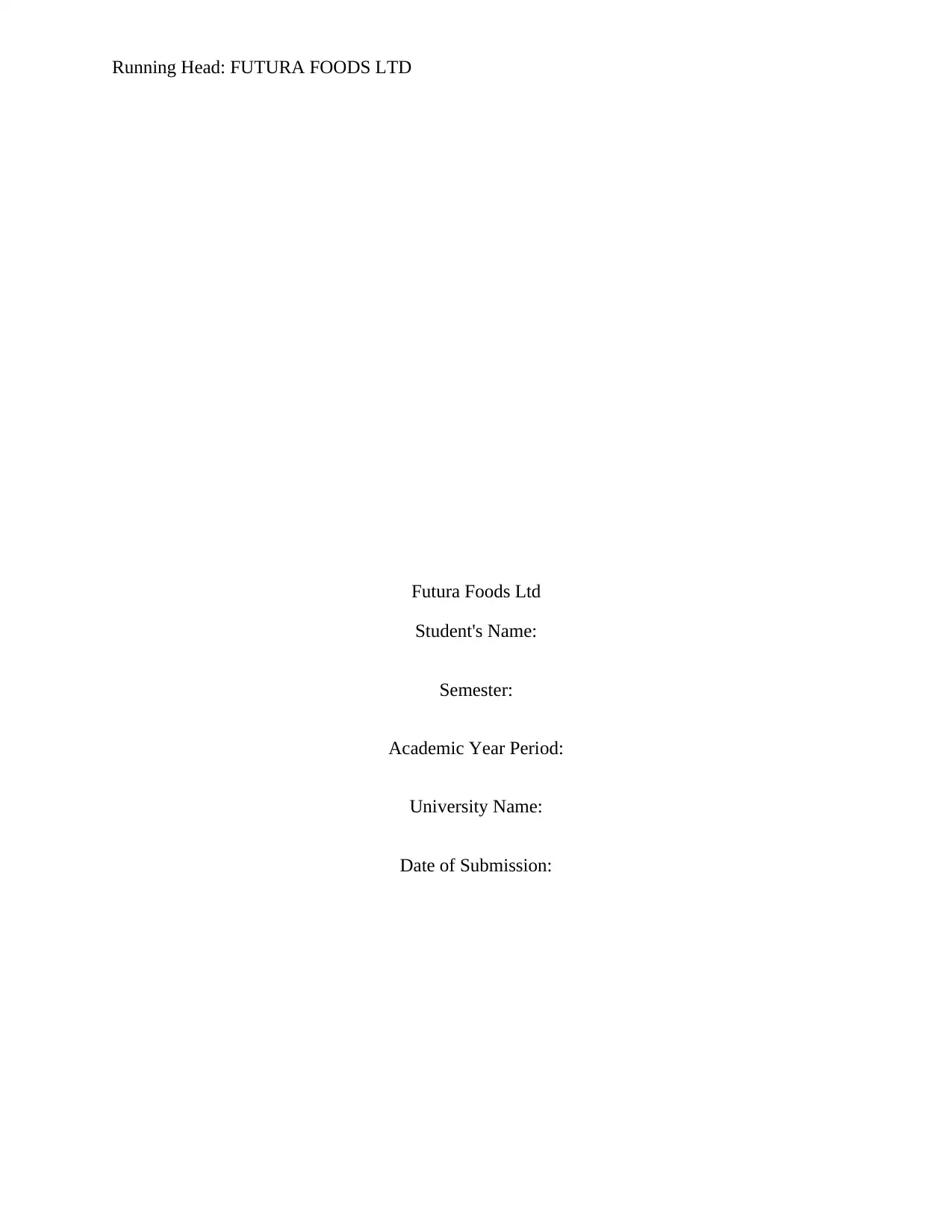
Running Head: FUTURA FOODS LTD
Futura Foods Ltd
Student's Name:
Semester:
Academic Year Period:
University Name:
Date of Submission:
Futura Foods Ltd
Student's Name:
Semester:
Academic Year Period:
University Name:
Date of Submission:
Paraphrase This Document
Need a fresh take? Get an instant paraphrase of this document with our AI Paraphraser
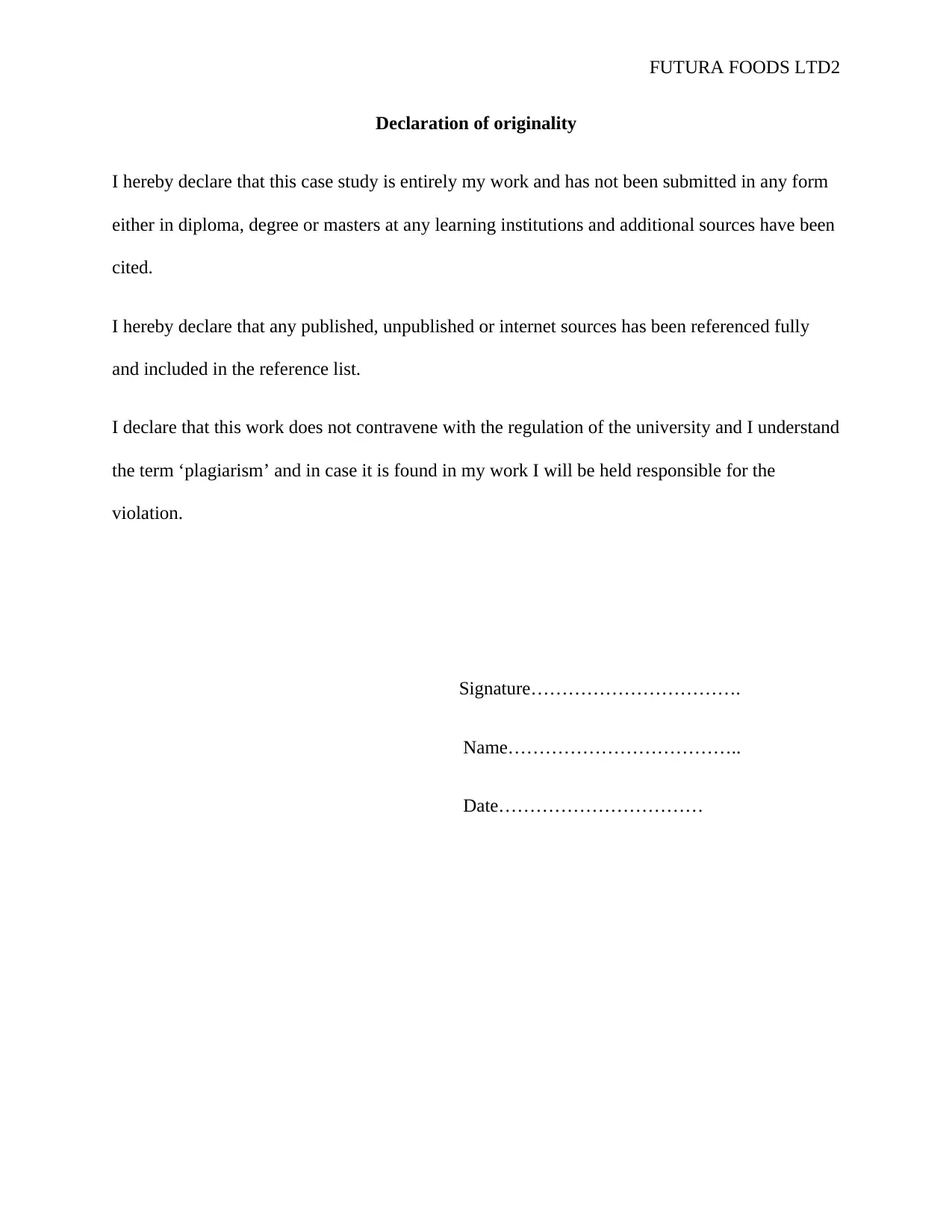
FUTURA FOODS LTD2
Declaration of originality
I hereby declare that this case study is entirely my work and has not been submitted in any form
either in diploma, degree or masters at any learning institutions and additional sources have been
cited.
I hereby declare that any published, unpublished or internet sources has been referenced fully
and included in the reference list.
I declare that this work does not contravene with the regulation of the university and I understand
the term ‘plagiarism’ and in case it is found in my work I will be held responsible for the
violation.
Signature…………………………….
Name………………………………..
Date……………………………
Declaration of originality
I hereby declare that this case study is entirely my work and has not been submitted in any form
either in diploma, degree or masters at any learning institutions and additional sources have been
cited.
I hereby declare that any published, unpublished or internet sources has been referenced fully
and included in the reference list.
I declare that this work does not contravene with the regulation of the university and I understand
the term ‘plagiarism’ and in case it is found in my work I will be held responsible for the
violation.
Signature…………………………….
Name………………………………..
Date……………………………
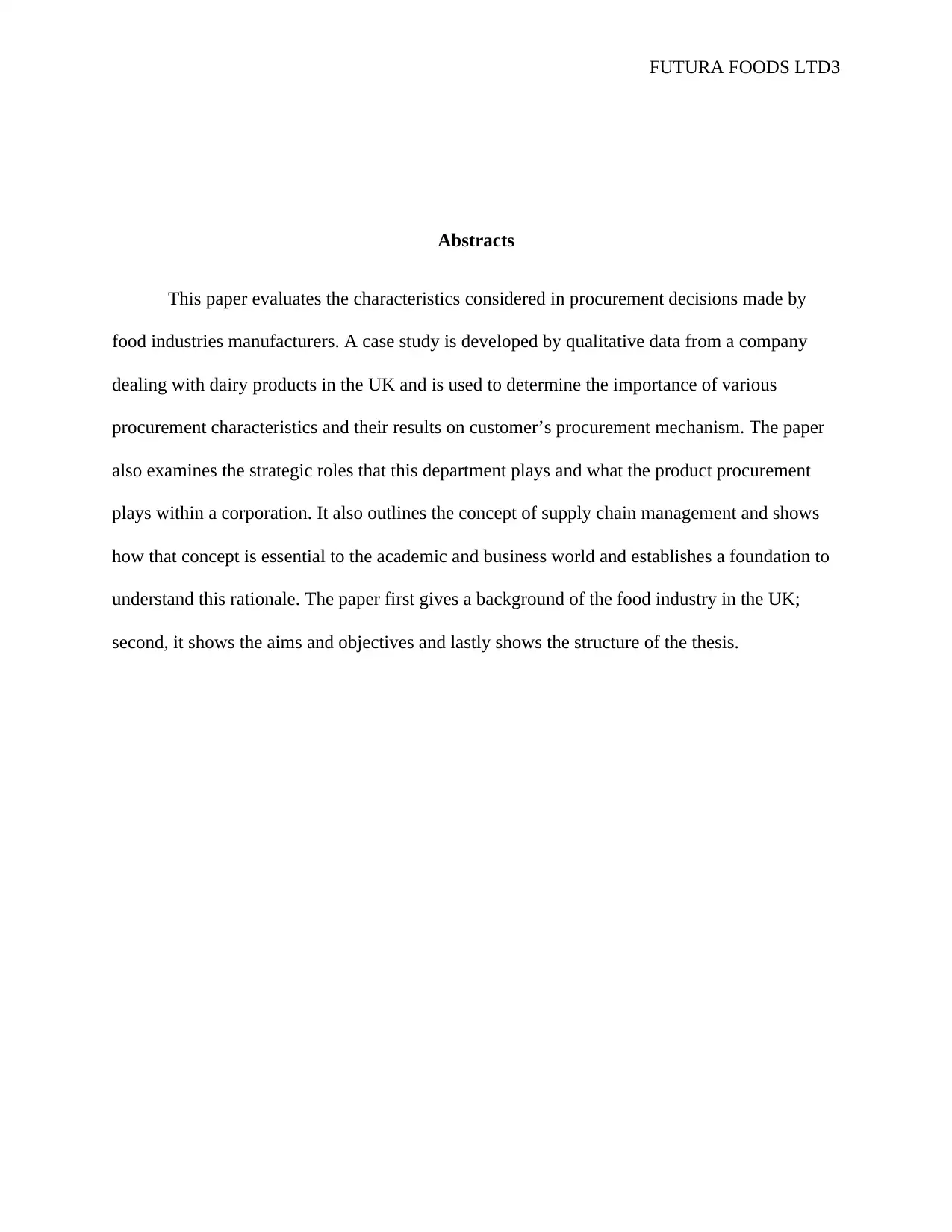
FUTURA FOODS LTD3
Abstracts
This paper evaluates the characteristics considered in procurement decisions made by
food industries manufacturers. A case study is developed by qualitative data from a company
dealing with dairy products in the UK and is used to determine the importance of various
procurement characteristics and their results on customer’s procurement mechanism. The paper
also examines the strategic roles that this department plays and what the product procurement
plays within a corporation. It also outlines the concept of supply chain management and shows
how that concept is essential to the academic and business world and establishes a foundation to
understand this rationale. The paper first gives a background of the food industry in the UK;
second, it shows the aims and objectives and lastly shows the structure of the thesis.
Abstracts
This paper evaluates the characteristics considered in procurement decisions made by
food industries manufacturers. A case study is developed by qualitative data from a company
dealing with dairy products in the UK and is used to determine the importance of various
procurement characteristics and their results on customer’s procurement mechanism. The paper
also examines the strategic roles that this department plays and what the product procurement
plays within a corporation. It also outlines the concept of supply chain management and shows
how that concept is essential to the academic and business world and establishes a foundation to
understand this rationale. The paper first gives a background of the food industry in the UK;
second, it shows the aims and objectives and lastly shows the structure of the thesis.
⊘ This is a preview!⊘
Do you want full access?
Subscribe today to unlock all pages.

Trusted by 1+ million students worldwide
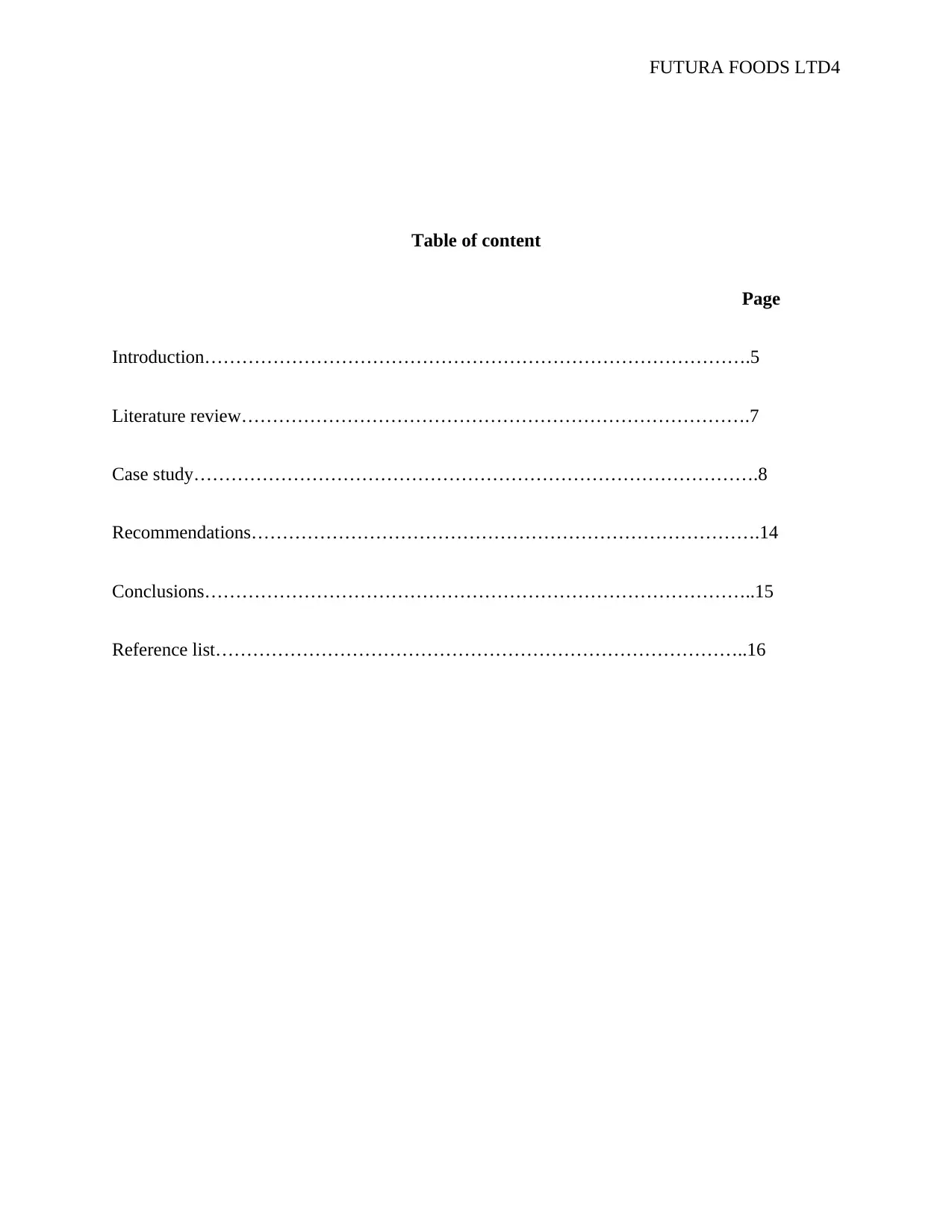
FUTURA FOODS LTD4
Table of content
Page
Introduction…………………………………………………………………………….5
Literature review……………………………………………………………………….7
Case study……………………………………………………………………………….8
Recommendations……………………………………………………………………….14
Conclusions……………………………………………………………………………..15
Reference list…………………………………………………………………………..16
Table of content
Page
Introduction…………………………………………………………………………….5
Literature review……………………………………………………………………….7
Case study……………………………………………………………………………….8
Recommendations……………………………………………………………………….14
Conclusions……………………………………………………………………………..15
Reference list…………………………………………………………………………..16
Paraphrase This Document
Need a fresh take? Get an instant paraphrase of this document with our AI Paraphraser
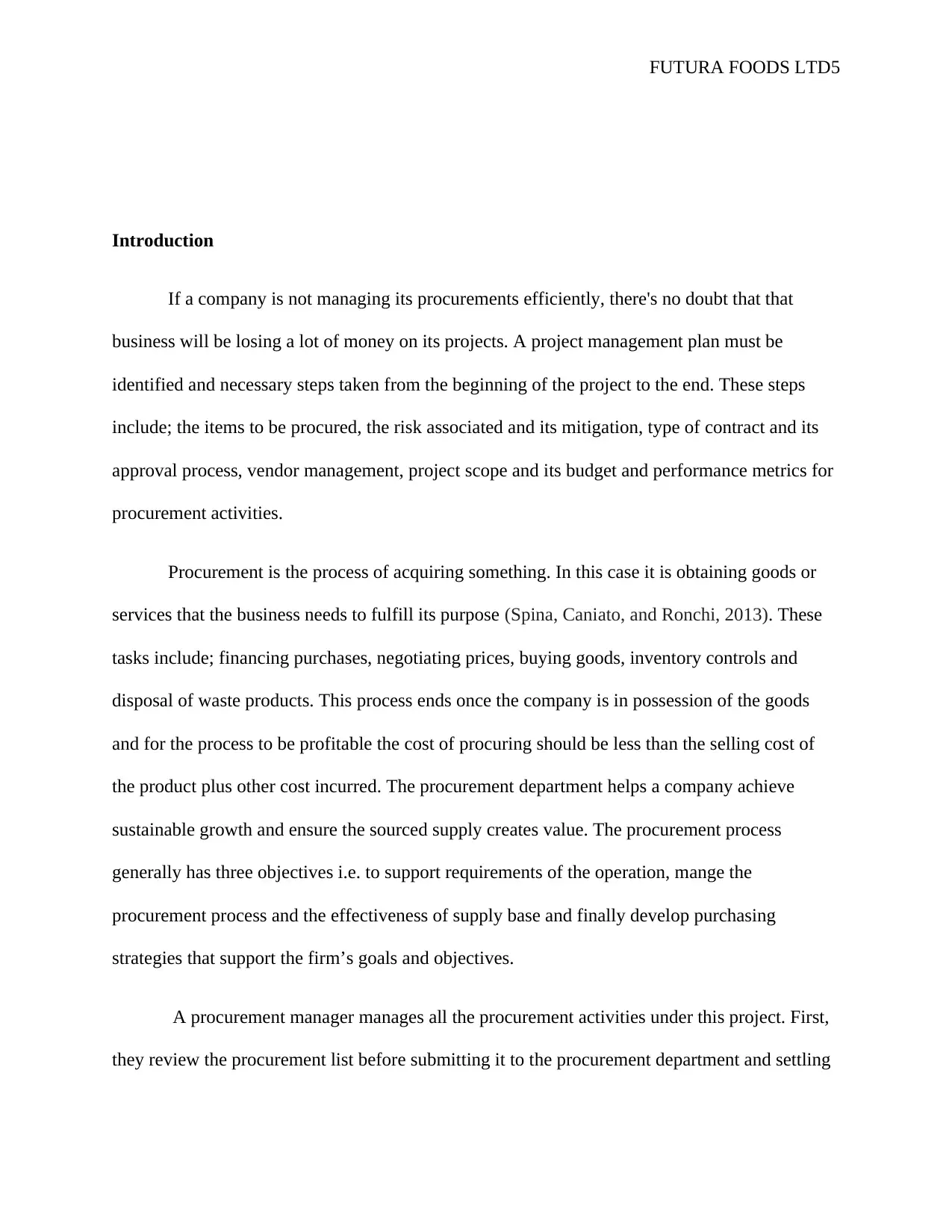
FUTURA FOODS LTD5
Introduction
If a company is not managing its procurements efficiently, there's no doubt that that
business will be losing a lot of money on its projects. A project management plan must be
identified and necessary steps taken from the beginning of the project to the end. These steps
include; the items to be procured, the risk associated and its mitigation, type of contract and its
approval process, vendor management, project scope and its budget and performance metrics for
procurement activities.
Procurement is the process of acquiring something. In this case it is obtaining goods or
services that the business needs to fulfill its purpose (Spina, Caniato, and Ronchi, 2013). These
tasks include; financing purchases, negotiating prices, buying goods, inventory controls and
disposal of waste products. This process ends once the company is in possession of the goods
and for the process to be profitable the cost of procuring should be less than the selling cost of
the product plus other cost incurred. The procurement department helps a company achieve
sustainable growth and ensure the sourced supply creates value. The procurement process
generally has three objectives i.e. to support requirements of the operation, mange the
procurement process and the effectiveness of supply base and finally develop purchasing
strategies that support the firm’s goals and objectives.
A procurement manager manages all the procurement activities under this project. First,
they review the procurement list before submitting it to the procurement department and settling
Introduction
If a company is not managing its procurements efficiently, there's no doubt that that
business will be losing a lot of money on its projects. A project management plan must be
identified and necessary steps taken from the beginning of the project to the end. These steps
include; the items to be procured, the risk associated and its mitigation, type of contract and its
approval process, vendor management, project scope and its budget and performance metrics for
procurement activities.
Procurement is the process of acquiring something. In this case it is obtaining goods or
services that the business needs to fulfill its purpose (Spina, Caniato, and Ronchi, 2013). These
tasks include; financing purchases, negotiating prices, buying goods, inventory controls and
disposal of waste products. This process ends once the company is in possession of the goods
and for the process to be profitable the cost of procuring should be less than the selling cost of
the product plus other cost incurred. The procurement department helps a company achieve
sustainable growth and ensure the sourced supply creates value. The procurement process
generally has three objectives i.e. to support requirements of the operation, mange the
procurement process and the effectiveness of supply base and finally develop purchasing
strategies that support the firm’s goals and objectives.
A procurement manager manages all the procurement activities under this project. First,
they review the procurement list before submitting it to the procurement department and settling
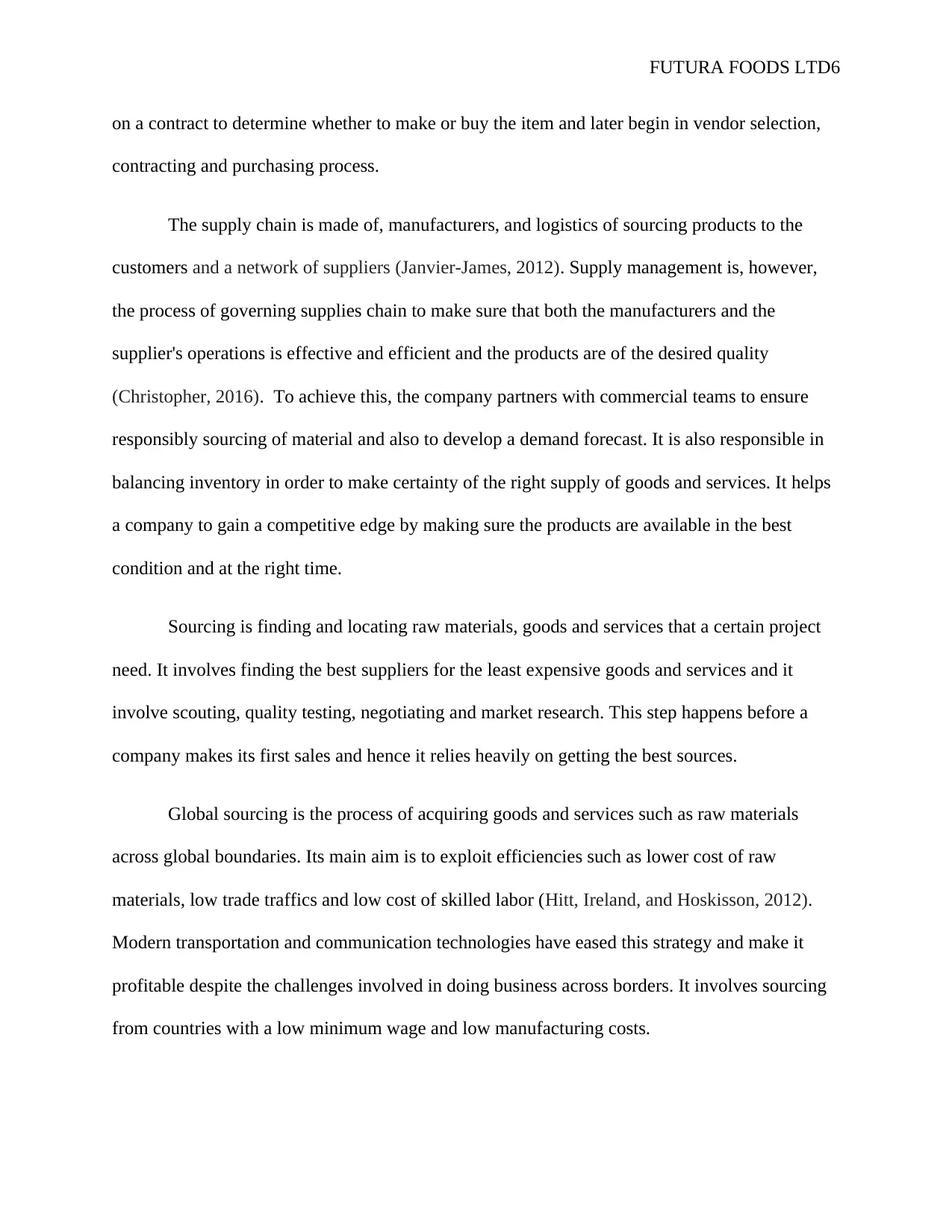
FUTURA FOODS LTD6
on a contract to determine whether to make or buy the item and later begin in vendor selection,
contracting and purchasing process.
The supply chain is made of, manufacturers, and logistics of sourcing products to the
customers and a network of suppliers (Janvier-James, 2012). Supply management is, however,
the process of governing supplies chain to make sure that both the manufacturers and the
supplier's operations is effective and efficient and the products are of the desired quality
(Christopher, 2016). To achieve this, the company partners with commercial teams to ensure
responsibly sourcing of material and also to develop a demand forecast. It is also responsible in
balancing inventory in order to make certainty of the right supply of goods and services. It helps
a company to gain a competitive edge by making sure the products are available in the best
condition and at the right time.
Sourcing is finding and locating raw materials, goods and services that a certain project
need. It involves finding the best suppliers for the least expensive goods and services and it
involve scouting, quality testing, negotiating and market research. This step happens before a
company makes its first sales and hence it relies heavily on getting the best sources.
Global sourcing is the process of acquiring goods and services such as raw materials
across global boundaries. Its main aim is to exploit efficiencies such as lower cost of raw
materials, low trade traffics and low cost of skilled labor (Hitt, Ireland, and Hoskisson, 2012).
Modern transportation and communication technologies have eased this strategy and make it
profitable despite the challenges involved in doing business across borders. It involves sourcing
from countries with a low minimum wage and low manufacturing costs.
on a contract to determine whether to make or buy the item and later begin in vendor selection,
contracting and purchasing process.
The supply chain is made of, manufacturers, and logistics of sourcing products to the
customers and a network of suppliers (Janvier-James, 2012). Supply management is, however,
the process of governing supplies chain to make sure that both the manufacturers and the
supplier's operations is effective and efficient and the products are of the desired quality
(Christopher, 2016). To achieve this, the company partners with commercial teams to ensure
responsibly sourcing of material and also to develop a demand forecast. It is also responsible in
balancing inventory in order to make certainty of the right supply of goods and services. It helps
a company to gain a competitive edge by making sure the products are available in the best
condition and at the right time.
Sourcing is finding and locating raw materials, goods and services that a certain project
need. It involves finding the best suppliers for the least expensive goods and services and it
involve scouting, quality testing, negotiating and market research. This step happens before a
company makes its first sales and hence it relies heavily on getting the best sources.
Global sourcing is the process of acquiring goods and services such as raw materials
across global boundaries. Its main aim is to exploit efficiencies such as lower cost of raw
materials, low trade traffics and low cost of skilled labor (Hitt, Ireland, and Hoskisson, 2012).
Modern transportation and communication technologies have eased this strategy and make it
profitable despite the challenges involved in doing business across borders. It involves sourcing
from countries with a low minimum wage and low manufacturing costs.
⊘ This is a preview!⊘
Do you want full access?
Subscribe today to unlock all pages.

Trusted by 1+ million students worldwide
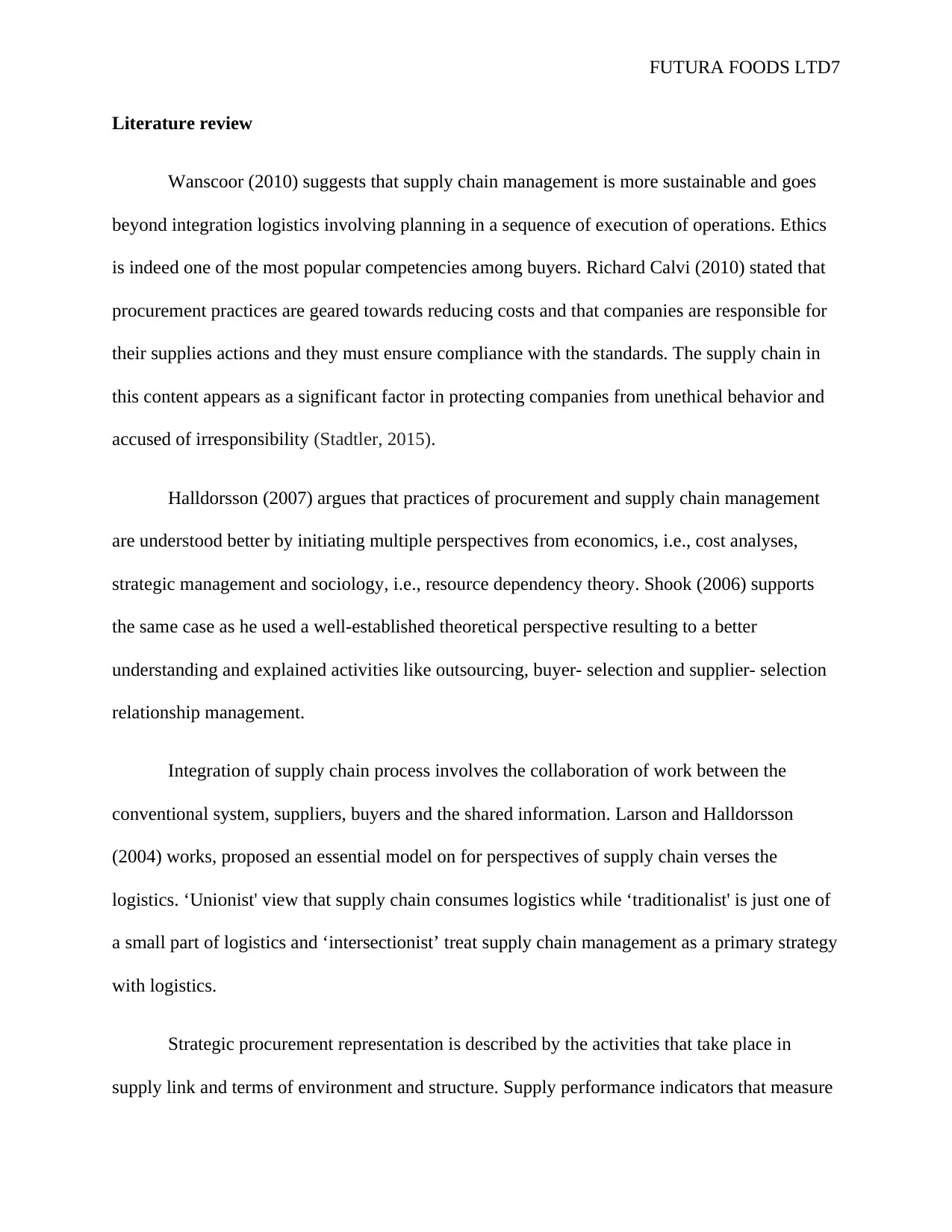
FUTURA FOODS LTD7
Literature review
Wanscoor (2010) suggests that supply chain management is more sustainable and goes
beyond integration logistics involving planning in a sequence of execution of operations. Ethics
is indeed one of the most popular competencies among buyers. Richard Calvi (2010) stated that
procurement practices are geared towards reducing costs and that companies are responsible for
their supplies actions and they must ensure compliance with the standards. The supply chain in
this content appears as a significant factor in protecting companies from unethical behavior and
accused of irresponsibility (Stadtler, 2015).
Halldorsson (2007) argues that practices of procurement and supply chain management
are understood better by initiating multiple perspectives from economics, i.e., cost analyses,
strategic management and sociology, i.e., resource dependency theory. Shook (2006) supports
the same case as he used a well-established theoretical perspective resulting to a better
understanding and explained activities like outsourcing, buyer- selection and supplier- selection
relationship management.
Integration of supply chain process involves the collaboration of work between the
conventional system, suppliers, buyers and the shared information. Larson and Halldorsson
(2004) works, proposed an essential model on for perspectives of supply chain verses the
logistics. ‘Unionist' view that supply chain consumes logistics while ‘traditionalist' is just one of
a small part of logistics and ‘intersectionist’ treat supply chain management as a primary strategy
with logistics.
Strategic procurement representation is described by the activities that take place in
supply link and terms of environment and structure. Supply performance indicators that measure
Literature review
Wanscoor (2010) suggests that supply chain management is more sustainable and goes
beyond integration logistics involving planning in a sequence of execution of operations. Ethics
is indeed one of the most popular competencies among buyers. Richard Calvi (2010) stated that
procurement practices are geared towards reducing costs and that companies are responsible for
their supplies actions and they must ensure compliance with the standards. The supply chain in
this content appears as a significant factor in protecting companies from unethical behavior and
accused of irresponsibility (Stadtler, 2015).
Halldorsson (2007) argues that practices of procurement and supply chain management
are understood better by initiating multiple perspectives from economics, i.e., cost analyses,
strategic management and sociology, i.e., resource dependency theory. Shook (2006) supports
the same case as he used a well-established theoretical perspective resulting to a better
understanding and explained activities like outsourcing, buyer- selection and supplier- selection
relationship management.
Integration of supply chain process involves the collaboration of work between the
conventional system, suppliers, buyers and the shared information. Larson and Halldorsson
(2004) works, proposed an essential model on for perspectives of supply chain verses the
logistics. ‘Unionist' view that supply chain consumes logistics while ‘traditionalist' is just one of
a small part of logistics and ‘intersectionist’ treat supply chain management as a primary strategy
with logistics.
Strategic procurement representation is described by the activities that take place in
supply link and terms of environment and structure. Supply performance indicators that measure
Paraphrase This Document
Need a fresh take? Get an instant paraphrase of this document with our AI Paraphraser
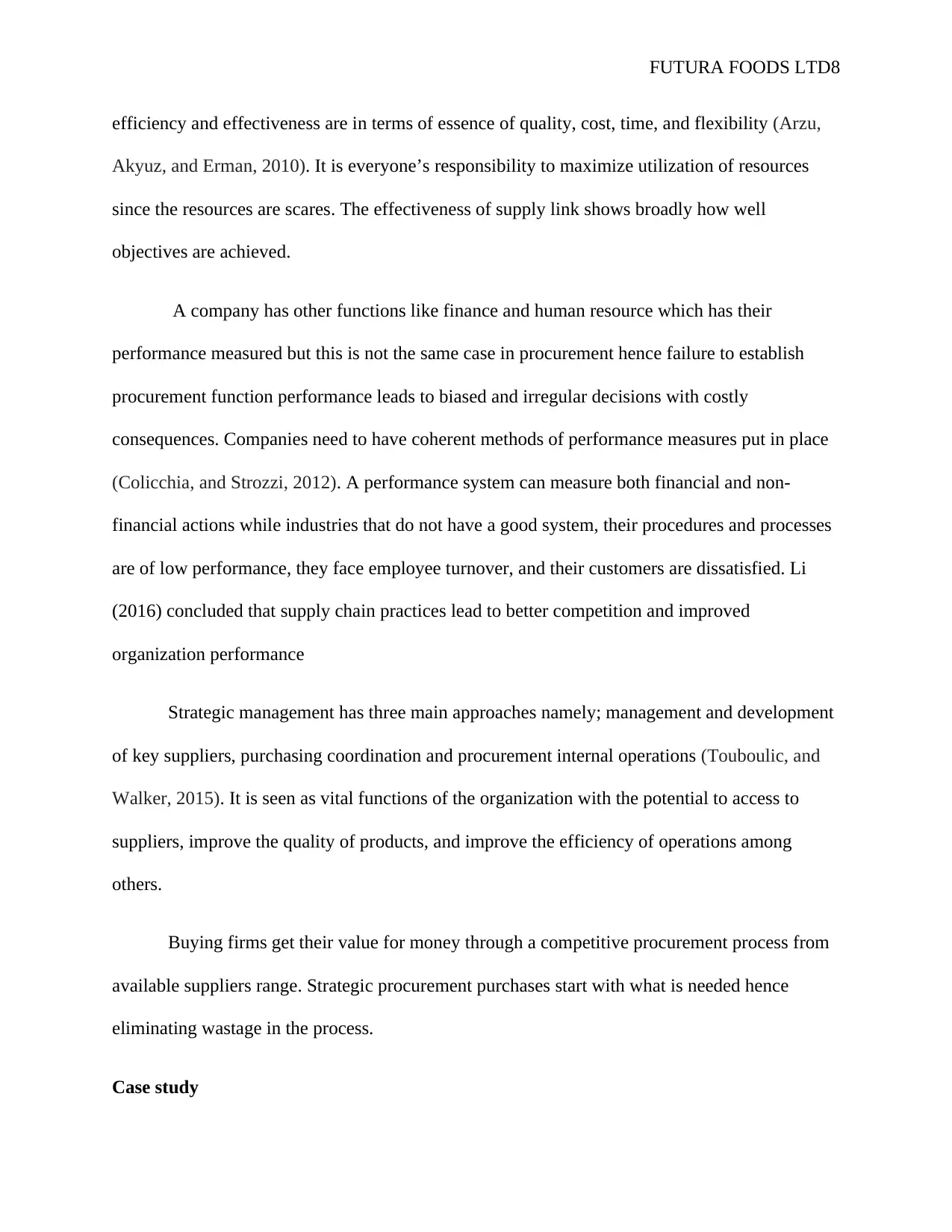
FUTURA FOODS LTD8
efficiency and effectiveness are in terms of essence of quality, cost, time, and flexibility (Arzu,
Akyuz, and Erman, 2010). It is everyone’s responsibility to maximize utilization of resources
since the resources are scares. The effectiveness of supply link shows broadly how well
objectives are achieved.
A company has other functions like finance and human resource which has their
performance measured but this is not the same case in procurement hence failure to establish
procurement function performance leads to biased and irregular decisions with costly
consequences. Companies need to have coherent methods of performance measures put in place
(Colicchia, and Strozzi, 2012). A performance system can measure both financial and non-
financial actions while industries that do not have a good system, their procedures and processes
are of low performance, they face employee turnover, and their customers are dissatisfied. Li
(2016) concluded that supply chain practices lead to better competition and improved
organization performance
Strategic management has three main approaches namely; management and development
of key suppliers, purchasing coordination and procurement internal operations (Touboulic, and
Walker, 2015). It is seen as vital functions of the organization with the potential to access to
suppliers, improve the quality of products, and improve the efficiency of operations among
others.
Buying firms get their value for money through a competitive procurement process from
available suppliers range. Strategic procurement purchases start with what is needed hence
eliminating wastage in the process.
Case study
efficiency and effectiveness are in terms of essence of quality, cost, time, and flexibility (Arzu,
Akyuz, and Erman, 2010). It is everyone’s responsibility to maximize utilization of resources
since the resources are scares. The effectiveness of supply link shows broadly how well
objectives are achieved.
A company has other functions like finance and human resource which has their
performance measured but this is not the same case in procurement hence failure to establish
procurement function performance leads to biased and irregular decisions with costly
consequences. Companies need to have coherent methods of performance measures put in place
(Colicchia, and Strozzi, 2012). A performance system can measure both financial and non-
financial actions while industries that do not have a good system, their procedures and processes
are of low performance, they face employee turnover, and their customers are dissatisfied. Li
(2016) concluded that supply chain practices lead to better competition and improved
organization performance
Strategic management has three main approaches namely; management and development
of key suppliers, purchasing coordination and procurement internal operations (Touboulic, and
Walker, 2015). It is seen as vital functions of the organization with the potential to access to
suppliers, improve the quality of products, and improve the efficiency of operations among
others.
Buying firms get their value for money through a competitive procurement process from
available suppliers range. Strategic procurement purchases start with what is needed hence
eliminating wastage in the process.
Case study
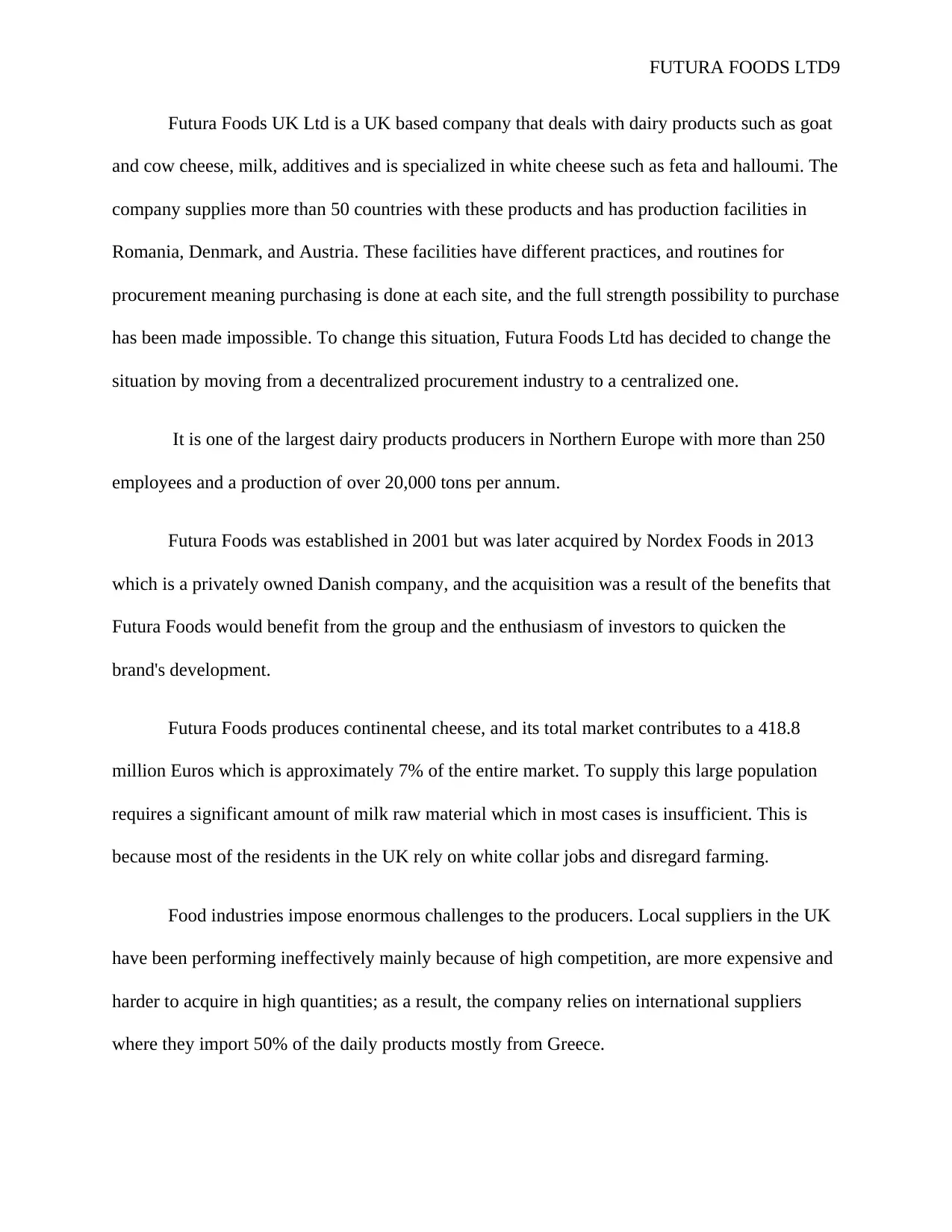
FUTURA FOODS LTD9
Futura Foods UK Ltd is a UK based company that deals with dairy products such as goat
and cow cheese, milk, additives and is specialized in white cheese such as feta and halloumi. The
company supplies more than 50 countries with these products and has production facilities in
Romania, Denmark, and Austria. These facilities have different practices, and routines for
procurement meaning purchasing is done at each site, and the full strength possibility to purchase
has been made impossible. To change this situation, Futura Foods Ltd has decided to change the
situation by moving from a decentralized procurement industry to a centralized one.
It is one of the largest dairy products producers in Northern Europe with more than 250
employees and a production of over 20,000 tons per annum.
Futura Foods was established in 2001 but was later acquired by Nordex Foods in 2013
which is a privately owned Danish company, and the acquisition was a result of the benefits that
Futura Foods would benefit from the group and the enthusiasm of investors to quicken the
brand's development.
Futura Foods produces continental cheese, and its total market contributes to a 418.8
million Euros which is approximately 7% of the entire market. To supply this large population
requires a significant amount of milk raw material which in most cases is insufficient. This is
because most of the residents in the UK rely on white collar jobs and disregard farming.
Food industries impose enormous challenges to the producers. Local suppliers in the UK
have been performing ineffectively mainly because of high competition, are more expensive and
harder to acquire in high quantities; as a result, the company relies on international suppliers
where they import 50% of the daily products mostly from Greece.
Futura Foods UK Ltd is a UK based company that deals with dairy products such as goat
and cow cheese, milk, additives and is specialized in white cheese such as feta and halloumi. The
company supplies more than 50 countries with these products and has production facilities in
Romania, Denmark, and Austria. These facilities have different practices, and routines for
procurement meaning purchasing is done at each site, and the full strength possibility to purchase
has been made impossible. To change this situation, Futura Foods Ltd has decided to change the
situation by moving from a decentralized procurement industry to a centralized one.
It is one of the largest dairy products producers in Northern Europe with more than 250
employees and a production of over 20,000 tons per annum.
Futura Foods was established in 2001 but was later acquired by Nordex Foods in 2013
which is a privately owned Danish company, and the acquisition was a result of the benefits that
Futura Foods would benefit from the group and the enthusiasm of investors to quicken the
brand's development.
Futura Foods produces continental cheese, and its total market contributes to a 418.8
million Euros which is approximately 7% of the entire market. To supply this large population
requires a significant amount of milk raw material which in most cases is insufficient. This is
because most of the residents in the UK rely on white collar jobs and disregard farming.
Food industries impose enormous challenges to the producers. Local suppliers in the UK
have been performing ineffectively mainly because of high competition, are more expensive and
harder to acquire in high quantities; as a result, the company relies on international suppliers
where they import 50% of the daily products mostly from Greece.
⊘ This is a preview!⊘
Do you want full access?
Subscribe today to unlock all pages.

Trusted by 1+ million students worldwide
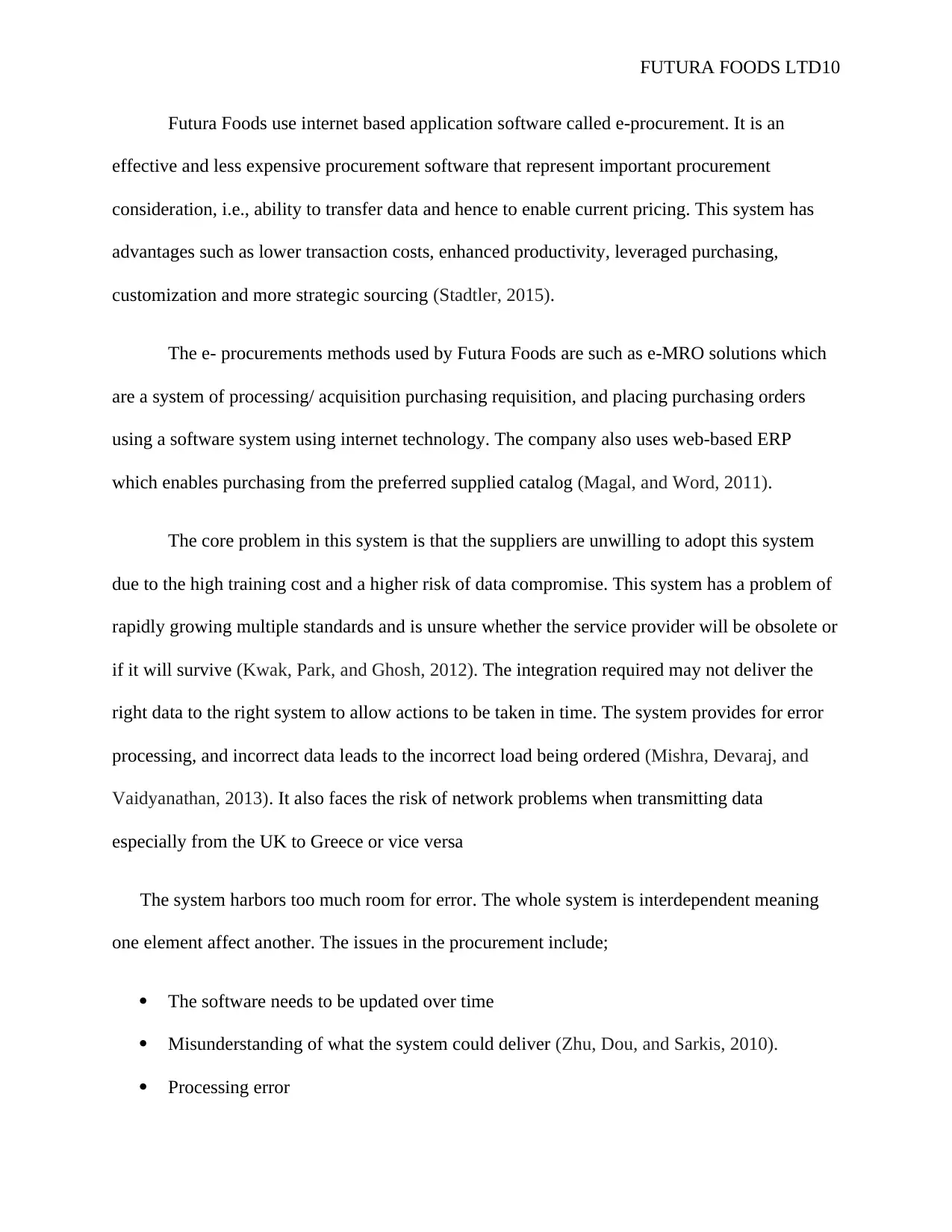
FUTURA FOODS LTD10
Futura Foods use internet based application software called e-procurement. It is an
effective and less expensive procurement software that represent important procurement
consideration, i.e., ability to transfer data and hence to enable current pricing. This system has
advantages such as lower transaction costs, enhanced productivity, leveraged purchasing,
customization and more strategic sourcing (Stadtler, 2015).
The e- procurements methods used by Futura Foods are such as e-MRO solutions which
are a system of processing/ acquisition purchasing requisition, and placing purchasing orders
using a software system using internet technology. The company also uses web-based ERP
which enables purchasing from the preferred supplied catalog (Magal, and Word, 2011).
The core problem in this system is that the suppliers are unwilling to adopt this system
due to the high training cost and a higher risk of data compromise. This system has a problem of
rapidly growing multiple standards and is unsure whether the service provider will be obsolete or
if it will survive (Kwak, Park, and Ghosh, 2012). The integration required may not deliver the
right data to the right system to allow actions to be taken in time. The system provides for error
processing, and incorrect data leads to the incorrect load being ordered (Mishra, Devaraj, and
Vaidyanathan, 2013). It also faces the risk of network problems when transmitting data
especially from the UK to Greece or vice versa
The system harbors too much room for error. The whole system is interdependent meaning
one element affect another. The issues in the procurement include;
The software needs to be updated over time
Misunderstanding of what the system could deliver (Zhu, Dou, and Sarkis, 2010).
Processing error
Futura Foods use internet based application software called e-procurement. It is an
effective and less expensive procurement software that represent important procurement
consideration, i.e., ability to transfer data and hence to enable current pricing. This system has
advantages such as lower transaction costs, enhanced productivity, leveraged purchasing,
customization and more strategic sourcing (Stadtler, 2015).
The e- procurements methods used by Futura Foods are such as e-MRO solutions which
are a system of processing/ acquisition purchasing requisition, and placing purchasing orders
using a software system using internet technology. The company also uses web-based ERP
which enables purchasing from the preferred supplied catalog (Magal, and Word, 2011).
The core problem in this system is that the suppliers are unwilling to adopt this system
due to the high training cost and a higher risk of data compromise. This system has a problem of
rapidly growing multiple standards and is unsure whether the service provider will be obsolete or
if it will survive (Kwak, Park, and Ghosh, 2012). The integration required may not deliver the
right data to the right system to allow actions to be taken in time. The system provides for error
processing, and incorrect data leads to the incorrect load being ordered (Mishra, Devaraj, and
Vaidyanathan, 2013). It also faces the risk of network problems when transmitting data
especially from the UK to Greece or vice versa
The system harbors too much room for error. The whole system is interdependent meaning
one element affect another. The issues in the procurement include;
The software needs to be updated over time
Misunderstanding of what the system could deliver (Zhu, Dou, and Sarkis, 2010).
Processing error
Paraphrase This Document
Need a fresh take? Get an instant paraphrase of this document with our AI Paraphraser
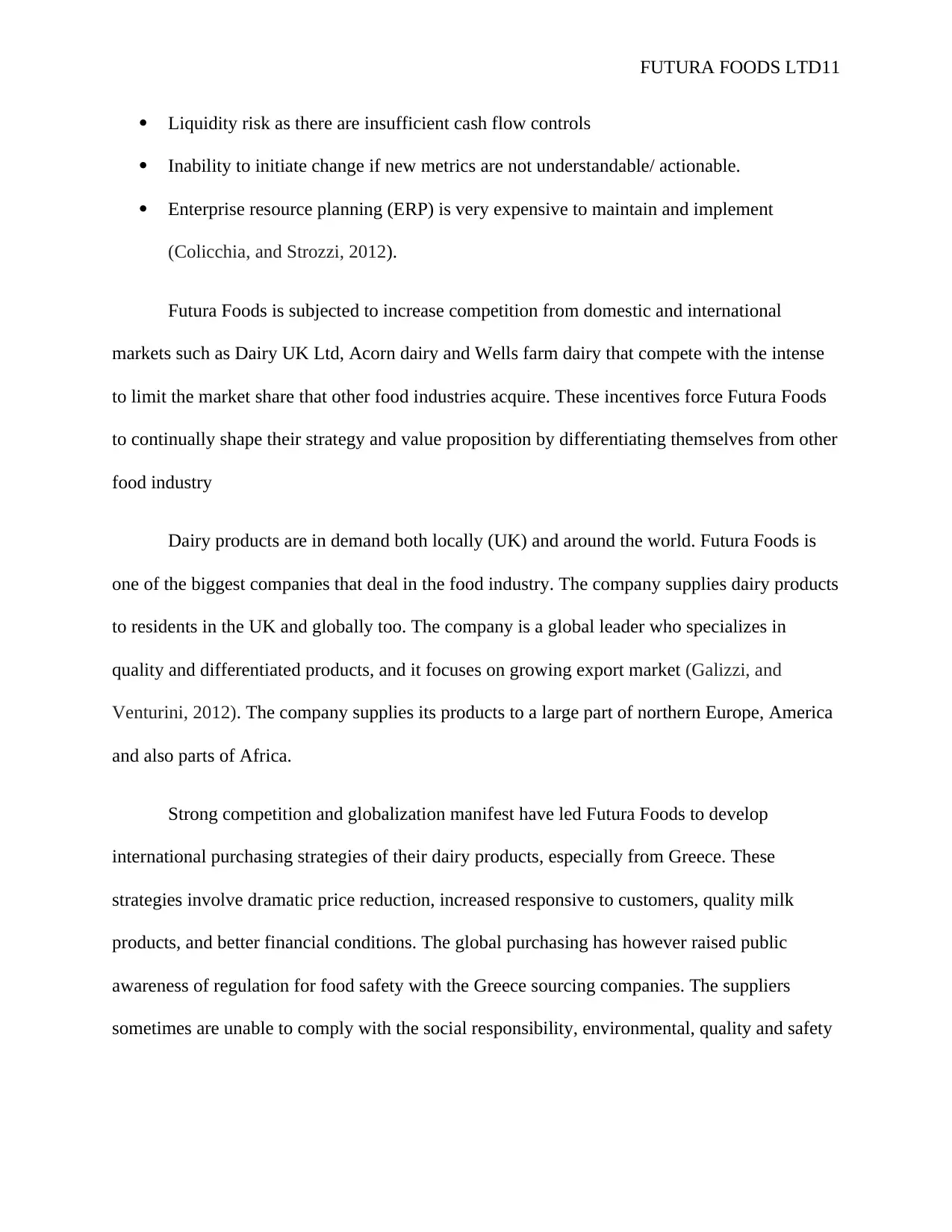
FUTURA FOODS LTD11
Liquidity risk as there are insufficient cash flow controls
Inability to initiate change if new metrics are not understandable/ actionable.
Enterprise resource planning (ERP) is very expensive to maintain and implement
(Colicchia, and Strozzi, 2012).
Futura Foods is subjected to increase competition from domestic and international
markets such as Dairy UK Ltd, Acorn dairy and Wells farm dairy that compete with the intense
to limit the market share that other food industries acquire. These incentives force Futura Foods
to continually shape their strategy and value proposition by differentiating themselves from other
food industry
Dairy products are in demand both locally (UK) and around the world. Futura Foods is
one of the biggest companies that deal in the food industry. The company supplies dairy products
to residents in the UK and globally too. The company is a global leader who specializes in
quality and differentiated products, and it focuses on growing export market (Galizzi, and
Venturini, 2012). The company supplies its products to a large part of northern Europe, America
and also parts of Africa.
Strong competition and globalization manifest have led Futura Foods to develop
international purchasing strategies of their dairy products, especially from Greece. These
strategies involve dramatic price reduction, increased responsive to customers, quality milk
products, and better financial conditions. The global purchasing has however raised public
awareness of regulation for food safety with the Greece sourcing companies. The suppliers
sometimes are unable to comply with the social responsibility, environmental, quality and safety
Liquidity risk as there are insufficient cash flow controls
Inability to initiate change if new metrics are not understandable/ actionable.
Enterprise resource planning (ERP) is very expensive to maintain and implement
(Colicchia, and Strozzi, 2012).
Futura Foods is subjected to increase competition from domestic and international
markets such as Dairy UK Ltd, Acorn dairy and Wells farm dairy that compete with the intense
to limit the market share that other food industries acquire. These incentives force Futura Foods
to continually shape their strategy and value proposition by differentiating themselves from other
food industry
Dairy products are in demand both locally (UK) and around the world. Futura Foods is
one of the biggest companies that deal in the food industry. The company supplies dairy products
to residents in the UK and globally too. The company is a global leader who specializes in
quality and differentiated products, and it focuses on growing export market (Galizzi, and
Venturini, 2012). The company supplies its products to a large part of northern Europe, America
and also parts of Africa.
Strong competition and globalization manifest have led Futura Foods to develop
international purchasing strategies of their dairy products, especially from Greece. These
strategies involve dramatic price reduction, increased responsive to customers, quality milk
products, and better financial conditions. The global purchasing has however raised public
awareness of regulation for food safety with the Greece sourcing companies. The suppliers
sometimes are unable to comply with the social responsibility, environmental, quality and safety
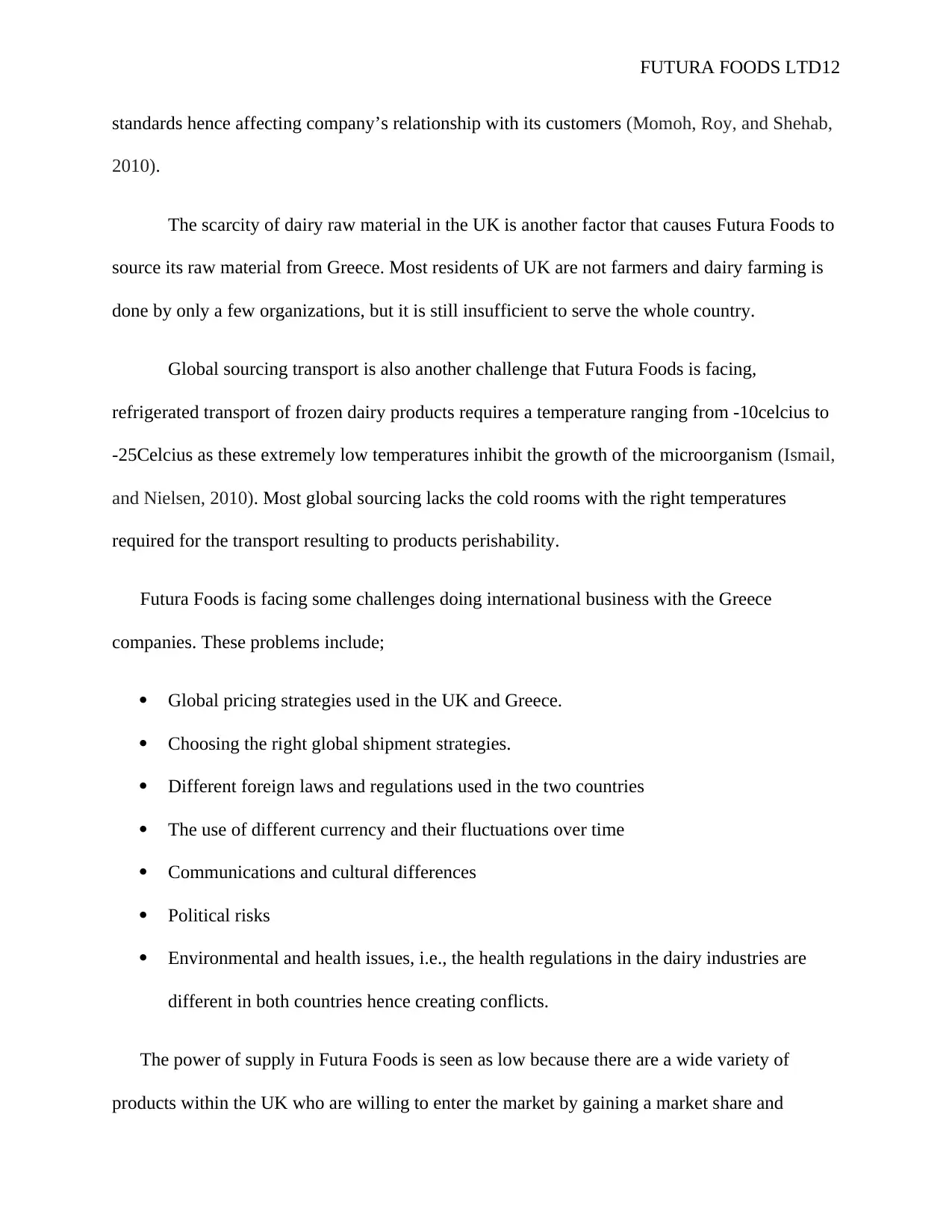
FUTURA FOODS LTD12
standards hence affecting company’s relationship with its customers (Momoh, Roy, and Shehab,
2010).
The scarcity of dairy raw material in the UK is another factor that causes Futura Foods to
source its raw material from Greece. Most residents of UK are not farmers and dairy farming is
done by only a few organizations, but it is still insufficient to serve the whole country.
Global sourcing transport is also another challenge that Futura Foods is facing,
refrigerated transport of frozen dairy products requires a temperature ranging from -10celcius to
-25Celcius as these extremely low temperatures inhibit the growth of the microorganism (Ismail,
and Nielsen, 2010). Most global sourcing lacks the cold rooms with the right temperatures
required for the transport resulting to products perishability.
Futura Foods is facing some challenges doing international business with the Greece
companies. These problems include;
Global pricing strategies used in the UK and Greece.
Choosing the right global shipment strategies.
Different foreign laws and regulations used in the two countries
The use of different currency and their fluctuations over time
Communications and cultural differences
Political risks
Environmental and health issues, i.e., the health regulations in the dairy industries are
different in both countries hence creating conflicts.
The power of supply in Futura Foods is seen as low because there are a wide variety of
products within the UK who are willing to enter the market by gaining a market share and
standards hence affecting company’s relationship with its customers (Momoh, Roy, and Shehab,
2010).
The scarcity of dairy raw material in the UK is another factor that causes Futura Foods to
source its raw material from Greece. Most residents of UK are not farmers and dairy farming is
done by only a few organizations, but it is still insufficient to serve the whole country.
Global sourcing transport is also another challenge that Futura Foods is facing,
refrigerated transport of frozen dairy products requires a temperature ranging from -10celcius to
-25Celcius as these extremely low temperatures inhibit the growth of the microorganism (Ismail,
and Nielsen, 2010). Most global sourcing lacks the cold rooms with the right temperatures
required for the transport resulting to products perishability.
Futura Foods is facing some challenges doing international business with the Greece
companies. These problems include;
Global pricing strategies used in the UK and Greece.
Choosing the right global shipment strategies.
Different foreign laws and regulations used in the two countries
The use of different currency and their fluctuations over time
Communications and cultural differences
Political risks
Environmental and health issues, i.e., the health regulations in the dairy industries are
different in both countries hence creating conflicts.
The power of supply in Futura Foods is seen as low because there are a wide variety of
products within the UK who are willing to enter the market by gaining a market share and
⊘ This is a preview!⊘
Do you want full access?
Subscribe today to unlock all pages.

Trusted by 1+ million students worldwide
1 out of 18
Related Documents
Your All-in-One AI-Powered Toolkit for Academic Success.
+13062052269
info@desklib.com
Available 24*7 on WhatsApp / Email
![[object Object]](/_next/static/media/star-bottom.7253800d.svg)
Unlock your academic potential
Copyright © 2020–2026 A2Z Services. All Rights Reserved. Developed and managed by ZUCOL.





